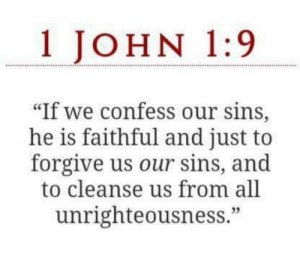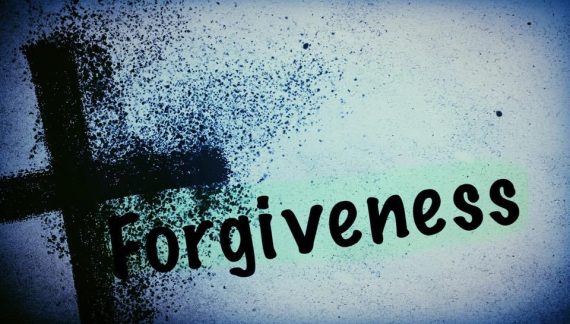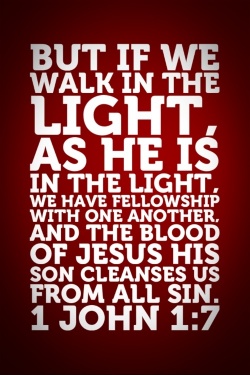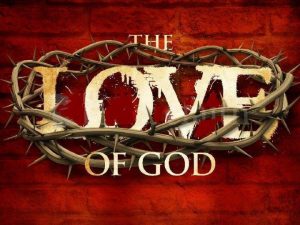In 1 John 1:9, we are invited to confess our sins so that God will forgive us. The verse says this:
If we confess our sins, He is faithful and just to forgive us our sins and to cleanse us from all unrighteousness.
But does this mean that if we do not confess our sins to God, He will not forgive us? No, the truth is that God has already forgiven you for all your sins, past, present, and future.
 So what did the Apostle John mean when he wrote 1 John 1:9? To understand this verse, we need to understand three things. We need to understand the meaning of the word “confess,” the meaning of the word “forgive” and the overall message and theme of 1 John.
So what did the Apostle John mean when he wrote 1 John 1:9? To understand this verse, we need to understand three things. We need to understand the meaning of the word “confess,” the meaning of the word “forgive” and the overall message and theme of 1 John.
Let us look at these three key ideas.
The Meaning of the Word “Confess”
The word confess comes from the Greek word homologeō, and it literally means “to say the same thing.” The word means more than just to admit, proclaim, or declare something. Instead, it has in view a conversation with God or others about what is true, and we agree with them about what they are saying.
The opposite of confession is denial (arneomai). When God makes a statement about some truth, we can either agree with God or disagree (John 1:20; 1 John 2:23). Therefore, the word “agree” might be the best translation of homologeō.
To confess is to align with what God is saying, or to agree with Him about something.

Obviously, there are lots of truths we can agree with God about. Almost every statement in Scripture requires us to either agree or disagree. Yet when we study the word confess in Scrip-ture, we discover that confession, or agreement with God, has nothing whatsoever to do with gaining or keeping our eternal life, but rather with aligning ourselves with God’s perspective on things.
Never forget that we gain the free gift of eternal life simply by believing in Jesus for it. No confession or agreement is necessary. No turning from sin. No submission to Jesus as Lord and Master. No public declaration about being part of the family of God.
All such things are good works that are important for the life of the Christian, but which are not requirements for receiving eternal life.
Yet after we believe in Jesus for eternal life, God begins to work with us as His children to mold us and conform us into who He created us to be. When we are born again into the family of God, we begin our life as one of His children.
But God does not stop with just giving us new life in Jesus. No, once we have life, He wants us to grow and mature and become productive members of His family. So through Scripture, the church, and the Holy Spirit, God begins to teach us things about Himself, about ourselves, and about how to follow Jesus. And when we see these truths, we can either agree with God or disagree.
If we agree with what God teaches us, then we align ourselves with what God has said, and we begin to make the necessary changes in our lives that come from this agreement.
But if we disagree, if we deny the truth of what God has said, then we continue to live in ignorance and self-deception, and we will not make progress in our lives as Christians. We will remain part of the family of God, but we will remain immature and fruitless.
So the word confess means to agree with about the things He teaches, especially regarding those things that help us live up to our identity as children of God.
This definition of “confess” will help us understand 1 John 1:9, but before we consider the verse, let us look at the word “forgive.”
The Meaning of the Word “Forgive”
I have gone over the meaning of the word “forgive” multiple times on this website, so I won’t go through it in depth again.
The main point to remember is that there are two kinds of forgiveness in the Bible. There is charizomai forgiveness, which is free and unconditional. God freely extends charizomai forgiveness to all people throughout all time for all sins, no matter what. Believers and unbelievers alike have charizomai forgiveness. It does not require confession or repentance. All sins–past, present, and future-are freely forgiven by God with this type of forgiveness.
The second type of forgiveness is aphesis forgiveness. It is always conditional, and is for our benefit; not God’s. Though God has freely forgiven us for all our sins, if we want to experience the release from the bondage of sin, then there are things we need to do … such as confess, repent, and purify our lives.
You can probably already guess which type of forgiveness is mentioned in 1 John 1:9. Yes, since confession is mentioned, then it makes sense that the second type of forgiveness, aphesis forgiveness, is in view.
See this article on forgiveness for more or you can also take the lesson on “Forgiveness” in my Gospel Dictionary Online Course.

And while this key helps our understanding of 1 John 1:9 the most, let us turn to the third key, which is the overall theme of 1 John.
The Overall Theme of 1 John
Some people think that the letter of 1 John is about how to know whether or not you have eternal life. Some people teach that 1 John contains “Tests of Life” and if you pass these tests, then you can know that you have life.
But this is not at all why John wrote this letter. Instead, as if evident from the opening verses, John wrote this letter because He had fellowship with Jesus, and wanted to share this fellowship with others.
“Fellowship” is just a biblical word for “friendship.” (This word also will be covered in the Gospel Dictionary Online Course).
 You can have a relationship with somebody, but not fellowship. For example, if you had a fight with one of your parents several years back, you are still related to them and are still part of the family, but you might not call them on the phone or get together for holidays. You are related, but do not have fellowship. You are not abiding or remaining with them in an ongoing friendship.
You can have a relationship with somebody, but not fellowship. For example, if you had a fight with one of your parents several years back, you are still related to them and are still part of the family, but you might not call them on the phone or get together for holidays. You are related, but do not have fellowship. You are not abiding or remaining with them in an ongoing friendship.
So John is writing his letter to Christians, to people who are in a relationship with God and with each other, as members of the family of God, and is telling them how to have fellowship with God and with each other. John wants His readers to be friends with God and friends with one another.
This also helps us understand 1 John 1:9.
Confession in 1 John 1:9
So let us take the three keys we have learned and put them all together as we seek to understand 1 John 1:9. Once again, the verse says this:
If we confess our sins, He is faithful and just to forgive us our sins and to cleanse us from all unrighteousness.
If you are in a relationship with someone, such as a spouse, a parent, or a child, and you want to maintain a friendship with them, then one of the things you will need to do is regularly own up to the things you have done wrong in that relationship.
Similarly, if someone wrongs or hurts you, this pain and betrayal causes a rift between the two of you, so that you probably don’t want to talk to them or hang out with them again. Oh yes, you are still related to them by the bonds of blood or marriage, but you might not want to spend much time in their presence.
But that rift, that pain, that sense of betrayal can be healed, right? And how can it be healed. By the other person owning up to what they did wrong, and by agreeing with you that what they said or did was hurtful to you. In other words, they need to confess their sin.
It is the same when you have wronged someone else. If you wronged somebody, you can’t just move on in the relationship acting as if nothing happened. The other person was hurt, and they need to know that you are sorry for what you did, and will work to make sure it doesn’t happen again.
All of this is also true in our relationship with God. When we sin, God is saddened by our behavior. As a result, our fellowship with God is broken. Just like Adam and Eve in the Garden of Eden, when we sin, we often go hide in the bushes because we do not feel like God wants to see us.
 The first step in healing this brokenness is by confessing our sin and agreeing with God that what we did was wrong.
The first step in healing this brokenness is by confessing our sin and agreeing with God that what we did was wrong.
So while God unconditionally extends forgiveness (charizomai) to all people, and so we are all forgiven for all our sins, if we want to actually experience a release (aphesis) from our bondage to sin, the first step is to agree (confess) with God that we have sinned.
If we do this, we will gain release from our slavery to sin, and He will work to cleanse us and purify us from all our unrighteous practices, and in this way, our fellowship with God will develop and grow.
So do you want to be friends with God? One of things that will help is letting Him point out your sin to you, so that you can agree (confess) with Him where you have indeed done wrong. Then, once you agree, let Him further guide you into breaking free from this sin so that you can no longer be addicted and enslaved to it.
This is the message of 1 John 1:9. If you agree with God when He points out your sin to you, He is faithful and just and will help release you from this sin, and will help guide you into all the ways of righteousness. This way of living will help you grow in friendship with God and others.
Does this help you understand 1 John 1:9 and the role of confession? If you still have questions or comments, leave them in the comment are below!
 Understanding the Gospel requires us to properly understand the key words and terms of the Gospel. Take my course, "The Gospel Dictionary" to learn about the 52 key words of the Gospel, and hundreds of Bible passages that use these words.
Understanding the Gospel requires us to properly understand the key words and terms of the Gospel. Take my course, "The Gospel Dictionary" to learn about the 52 key words of the Gospel, and hundreds of Bible passages that use these words.
This course costs $297, but when you join the Discipleship group, you can to take the entire course for free.




 1 John 1:7-10 does get discussed in various ways through my online course “
1 John 1:7-10 does get discussed in various ways through my online course “ And while it is true that they might be guilty of some of the things we accuse them of, the human tendency is to amplify the sinful behavior of others so that we can turn them into monsters, and dehumanize them, so that we can condemn them, or send them into exile, or even kill them in the name of God.
And while it is true that they might be guilty of some of the things we accuse them of, the human tendency is to amplify the sinful behavior of others so that we can turn them into monsters, and dehumanize them, so that we can condemn them, or send them into exile, or even kill them in the name of God. There are
There are  John is primarily interested in make sure that his readers recognize how they have been involved in the violent, bloody, accusatory, scapegoating practices that run this world, and turn from such behaviors to walk in the light of God’s love.
John is primarily interested in make sure that his readers recognize how they have been involved in the violent, bloody, accusatory, scapegoating practices that run this world, and turn from such behaviors to walk in the light of God’s love.

 But there comes a day in the life of every believer when God decided to start working on us with a particular sin. There is no set order or timeframe on sins God seeks to liberate us from. God works with each person in His own time and His own way. But He does work on each one of us. God decides that a particular behavior or thought pattern in our life must change. He wants to make us look more like Jesus, and help us better reveal the light of the Gospel, and to do that, we must straighten out a particular area of our life.
But there comes a day in the life of every believer when God decided to start working on us with a particular sin. There is no set order or timeframe on sins God seeks to liberate us from. God works with each person in His own time and His own way. But He does work on each one of us. God decides that a particular behavior or thought pattern in our life must change. He wants to make us look more like Jesus, and help us better reveal the light of the Gospel, and to do that, we must straighten out a particular area of our life.